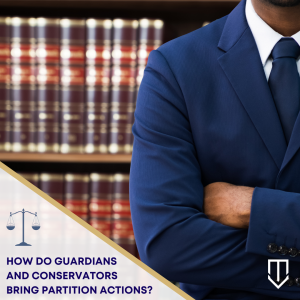
Yes, but only in specific circumstances. When thinking of lawsuits, most people associate them with individuals. John may sue Mary for battery, for example. But this isn’t always the case. A large part of the law is devoted to virtual representation because some people, like minors, simply cannot file suit.
This is where guardians and conservators come into play. These are officers that can be appointed or approved by the court and whose sole responsibility is the management of a person or thing on their behalf. Commonly, we associate conservators with property and guardians with people, but the differences are, in actuality, quite minute. Partitions are lawsuits that seek to divide up the shared equity in a property. But what happens when one of the owners is a minor or so elderly that they cannot manage the property on their own?
At Underwood Law Firm, we have the answers. Our attorneys are more than familiar with partitions and the complexities such lawsuits can entail, particularly when conservatorships or trusts are involved. With our attorneys at your side, you can be sure that we will best assist you in achieving your litigation objectives.
Who can normally bring a partition suit?
The California Code of Civil Procedure is very explicit on those persons entitled to begin a partition suit. (CCP § 872.210.) Partitions can be commenced by: (1) a co-owner of property; or (2) an owner of a life estate/estate of inheritance where such property is owned by several persons concurrently or in successive estates. This second class refers to property owned in such a way that there are both present “possessory” interest holders and future interest holders. That said, over the years, the courts have developed exceptions to this general rule. For example, under the predecessor partition statutes, a trustee could file a partition suit, but only if they were also a co-owner of the property. (O’Bryant v. Bosserman (1949) 94 Cal.App.2d 353, 355.) While this is still the case, the partition statutes have been broadened to give the court fairly broad discretion in the case of successive estates. (CCP § 872.710 (c).)
What are guardians and conservators?
Guardians and conservators are two sides of the same coin. When someone lacks the capacity to sue or defend themselves in a lawsuit, the court will appoint an officer to assist this incapacitated person (the “conservatee” or “ward”). This is not to say that they are actually “incapacitated” in the ordinary sense. Rather, this label refers purely to those individuals who need assistance because of their mental or physical state.
For instance, “guardians ad litem” are guardians for minors who, under the law, cannot defend themselves in a suit on their own. In fact, the California Legislature converted all adult guardianships into conservatorships purely to reduce the stigma attached to elderly individuals being labeled “mentally incompetent” just because they needed assistance in managing their financial and personal affairs. (Brown v. Labow (2007) 157 Cal.App.4th 795, 808.)
Public policy aside, however, these court officers play an integral role in ensuring all persons are properly represented in a court of law. They are not themselves parties to the lawsuit but instead representatives of record. (J.W. v. Superior Court (1993) 17 Cal.App.4th 958, 965.) That said, they are nonetheless required to act in the best interest of their wards or conservatees. The relationship is so important and “confidential” that guardians and conservators are actually considered fiduciaries under the law, carrying with them a heightened level of duty and responsibility for those in their care. (Prob. Code § 2101.)
How do guardians and conservators bring partition actions?
Under the Probate Code, there are two situations that involve partitions and personal representatives. (Prob. Code § 9823.) First, if the former owner of the property dies, and leaves an undivided interest amongst their heirs, one of the heirs may bring a partition against the conservator of the estate itself. Second, the conservator themself can also institute a partition, provided the decedent left an undivided interest. This section is incredibly important because it refers to guardians of estates, not of people. And the law suggests that a guardian or conservator of a person would actually not be able to commence a partition suit. Under Probate Code section 2351, a conservator has the “care, custody, and control of, and has charge of the education of, the ward or conservatee.” While broad in scope, that language has actually been held not to grant the conservator the authority to prosecute civil claims or lawsuits on behalf of the conservatee. (Kagy v. Napa State Hospital (1994) 28 Cal.App.4th 1, 6.)
By means of example, suppose John owns a home and leaves it undivided to his two infant children upon death. Guardians are subsequently appointed for the infant children. Under the law, it appears the guardians could not commence partition actions against the property. The guardian of the estate itself, however, would be entitled to commence the action under the Probate Code.
How can the Attorneys at Underwood Law Assist You?
Partitions are fairly common in California, particularly among unmarried couples and business partners. But the presence of a guardian or conservatorship associated with the property can cause additional headaches to first-time litigants. Partitions are already emotional procedures, and the time, money, and legalese associated with getting them started can be a significant barrier to exercising one’s property rights. As each case is unique, property owners would be well-served to seek experienced counsel familiar with the ins and outs of partitions and co-ownership. At Underwood Law, our knowledgeable attorneys are here to help. If you are concerned about facing a partition action, if you’re interested in seeking one yourself, or if you just have questions, please do not hesitate to contact our office.










